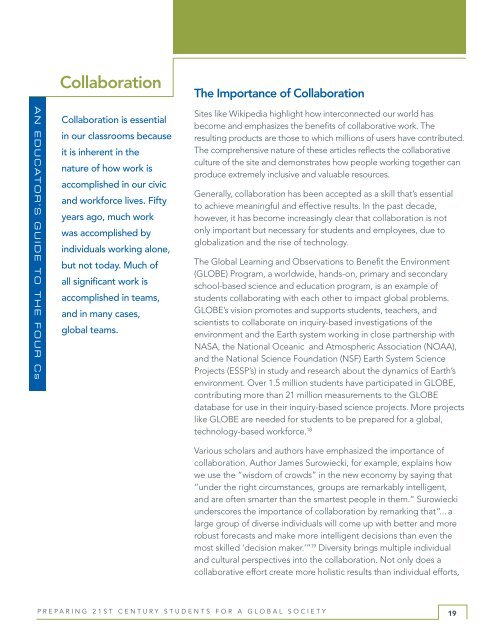Preparing 21st Century Students for a Global Society
Preparing 21st Century Students for a Global Society
Preparing 21st Century Students for a Global Society
Create successful ePaper yourself
Turn your PDF publications into a flip-book with our unique Google optimized e-Paper software.
A n E d u c At o r ’ s G u i d E t o t h E F o u r c s<br />
Collaboration<br />
Collaboration is essential<br />
in our classrooms because<br />
it is inherent in the<br />
nature of how work is<br />
accomplished in our civic<br />
and work<strong>for</strong>ce lives. Fifty<br />
years ago, much work<br />
was accomplished by<br />
individuals working alone,<br />
but not today. Much of<br />
all significant work is<br />
accomplished in teams,<br />
and in many cases,<br />
global teams.<br />
The Importance of Collaboration<br />
P r e P a r i n g 2 1 s t C e n t u r y s t u d e n t s f o r a g l o b a l s o C i e t y<br />
Sites like Wikipedia highlight how interconnected our world has<br />
become and emphasizes the benefits of collaborative work. The<br />
resulting products are those to which millions of users have contributed.<br />
The comprehensive nature of these articles reflects the collaborative<br />
culture of the site and demonstrates how people working together can<br />
produce extremely inclusive and valuable resources.<br />
Generally, collaboration has been accepted as a skill that’s essential<br />
to achieve meaningful and effective results. In the past decade,<br />
however, it has become increasingly clear that collaboration is not<br />
only important but necessary <strong>for</strong> students and employees, due to<br />
globalization and the rise of technology.<br />
The <strong>Global</strong> Learning and Observations to Benefit the Environment<br />
(GLOBE) Program, a worldwide, hands-on, primary and secondary<br />
school-based science and education program, is an example of<br />
students collaborating with each other to impact global problems.<br />
GLOBE’s vision promotes and supports students, teachers, and<br />
scientists to collaborate on inquiry-based investigations of the<br />
environment and the Earth system working in close partnership with<br />
NASA, the National Oceanic and Atmospheric Association (NOAA),<br />
and the National Science Foundation (NSF) Earth System Science<br />
Projects (ESSP’s) in study and research about the dynamics of Earth’s<br />
environment. Over 1.5 million students have participated in GLOBE,<br />
contributing more than 21 million measurements to the GLOBE<br />
database <strong>for</strong> use in their inquiry-based science projects. More projects<br />
like GLOBE are needed <strong>for</strong> students to be prepared <strong>for</strong> a global,<br />
technology-based work<strong>for</strong>ce. 18<br />
Various scholars and authors have emphasized the importance of<br />
collaboration. Author James Surowiecki, <strong>for</strong> example, explains how<br />
we use the “wisdom of crowds” in the new economy by saying that<br />
“under the right circumstances, groups are remarkably intelligent,<br />
and are often smarter than the smartest people in them.” Surowiecki<br />
underscores the importance of collaboration by remarking that “... a<br />
large group of diverse individuals will come up with better and more<br />
robust <strong>for</strong>ecasts and make more intelligent decisions than even the<br />
most skilled ‘decision maker.’” 19 Diversity brings multiple individual<br />
and cultural perspectives into the collaboration. Not only does a<br />
collaborative ef<strong>for</strong>t create more holistic results than individual ef<strong>for</strong>ts,<br />
19


